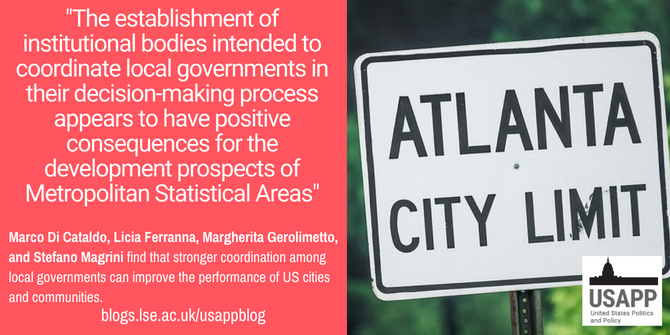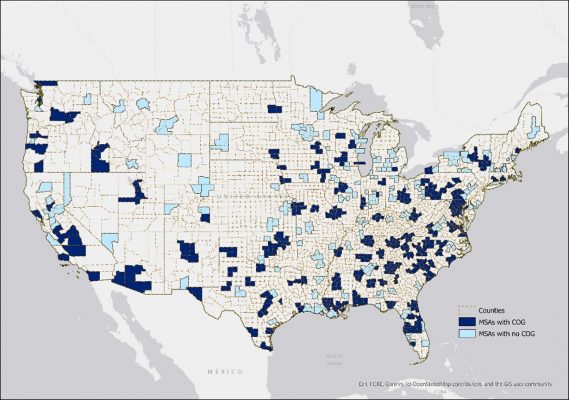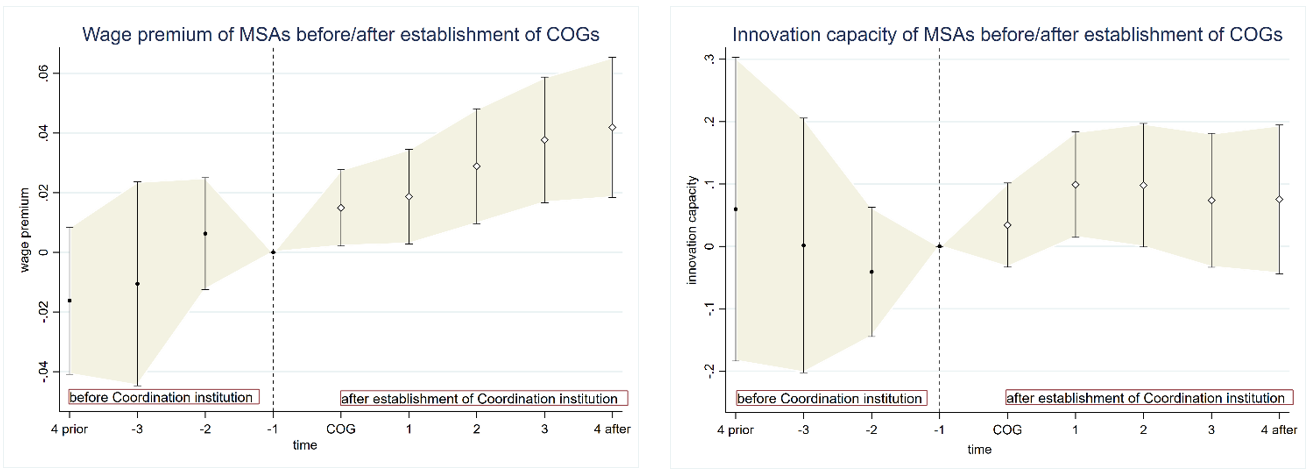


 Can changes in the structure of local governance influence the prosperity of American cities and communities? Marco Di Cataldo, Licia Ferranna, Margherita Gerolimetto, and Stefano Magrini look at how the performance of US metropolitan areas (MSAs) are affected by the creation of new local governments, and the establishment of authorities fostering local governments collaboration. They find that higher cooperation among local governments significantly boosts MSAs’ wage premium and innovation capacity, while creating new counties and municipalities harms its wage premium, with no effect on innovation.
Can changes in the structure of local governance influence the prosperity of American cities and communities? Marco Di Cataldo, Licia Ferranna, Margherita Gerolimetto, and Stefano Magrini look at how the performance of US metropolitan areas (MSAs) are affected by the creation of new local governments, and the establishment of authorities fostering local governments collaboration. They find that higher cooperation among local governments significantly boosts MSAs’ wage premium and innovation capacity, while creating new counties and municipalities harms its wage premium, with no effect on innovation.
In the 1950s the Metropolitan Area of Sacramento, California had 5 municipalities. Today it has 22. Similarly, in 1950, Atlanta, Georgia had 24 municipalities; this has now frown to more than 110. Reforms that change the number and the function of local government and governance have become more and more frequent in recent years. These changes to the structures of local governance are usually made to optimizing the policy-making process, provide better public services to citizens, and, consequently, improve the local economy and labor market. One such institutional reform concerns the number of local governments – counties and municipalities – that operate within US Metropolitan Statistical Areas (MSAs). The MSAs are regions which have a high population density and level of activity. Many new counties and municipalities have been created in recent decades, often following changes in the physical extension of MSAs. These variations have been made also by MSAs keeping their shape unchanged over time, while communities change within, such as in the above Sacramento example.
At the same time, many US urban areas have established ‘voluntary agreements’ of counties within MSAs, intended to deal with policy coordination issues at a metropolitan scale. These are the Councils of Government (COGs), also called regional councils or regional planning commissions, which have been implemented in a variety of forms. Many COGs have a long history and have evolved over time, generally increasing the role and responsibilities as coordinating platforms within metropolitan areas.

“Atlanta City Limit” (CC BY 2.0) by Lee Edwin Coursey
How does municipal institutional reform affect employment and innovation?
In new research, we have used information on changes in institutional structure within MSAs and the timing of establishment and extension of COGs (Figure 1), to examine how these types of institutional reforms have affected wage premiums and innovation capacity in the long term. We used a sample of 330 MSAs with over 100,000 inhabitants between 1950 and 2010.
Figure 1 – MSAs in sample with/without Council of Governments

We find that an increase in the degree of local government fragmentation, through the sub-division of metropolitan areas into a larger number of counties or municipalities, seems to bear no benefits in terms of higher wages and greater innovation capacity. On the contrary, a more fragmented institutional landscape is linked with a worse performance of urban areas, especially in terms of productivity. These dynamics seem to occur especially when MSAs keep their shape constant over time, while the number of local jurisdictions increases. These may be the cases in which the creation of new jurisdictions is mainly driven by political considerations, with little or no economic rationale. In addition, a more fragmented institutional landscape seems to leave urban areas’ capacity to innovate unaffected.
Greater coordination among local governments helps wages
On the other hand, the establishment of institutional bodies intended to coordinate local governments in their decision-making process appears to have positive consequences for the development prospects of Metropolitan Statistical Areas (MSAs). The activity of coordinating institutions can increase the wage premium of MSAs, but only if these institutions are composed of representatives of local governments that make part of the same functional economic area. In this case, metropolitan areas establishing a Councils of Government (COGs), relative to areas with no COGs, experience a 2.4 percent higher wage premium. At the same time, the establishment of this kind of institutional arrangement is related to a stronger capacity to innovate of metropolitan areas. Interestingly, this result applies both to COGs that only include local government members of the same MSA and to COGs that span multiple metropolitan areas. In the former case, COGs lead to an increase in patenting capacity by 7.6 percent, while in the latter the effect is even stronger, with an increase by 19 percent. Coordination agreements among local governments seem to have structural and long-lasting effects on the performance of MSAs, as these dynamics appear strongly persistent over time (Figure 2).
Figure 2 – Wage premium and innovation capacity of MSAs before/after establishment of COGs

Our findings offer important insights into the role of institutional structures for the socio-economic development of urban areas. Reforming the structure of governance towards a ‘proliferation’ of local governments does not seem to bring positive consequences for metropolitan areas. If anything, their overall conditions are penalized by the creation of new institutional entities. This appears to be particularly the case when the creation of new local jurisdictions completely abstracts from the commuting patterns of MSA citizens.
Conversely, strengthening coordination mechanisms among local governments belonging to the same functional economic system contributes to the development of scale economies. Adding to that, local government coordination triggers mechanisms stimulating the interaction of local economic agents, which are vital for well-functioning innovation systems. Due to the well-known importance of technical progress and innovation for local economic growth, this suggests that fostering government cooperation on matters of mutual policy concern may be a fundamental tool to boost the overall economic dynamism of urban territories.
These results are ever more relevant considering the popularity this kind of institutional reforms have had in recent years, in the US and abroad. Local policymakers should be aware that, if well-conceived, municipal coordination mechanisms can produce effects going well beyond public service facilitation for citizens, benefitting the labor market and economy of metropolitan areas at large. However, not all municipal cooperations arrangements have this capacity. The larger impacts seem to accrue when cooperation agreements precede modifications of metropolitan areas’ borders, hence making these areas more prepared for such changes.
- This article is based on the paper, “Splitting Up or Dancing Together? Local Institutional Structure and the Performance of Urban Areas” in Economic Geography.
- Please read our comments policy before commenting.
- Note: This article gives the views of the author, and not the position of USAPP – American Politics and Policy, nor the London School of Economics.
- Shortened URL for this post: https://bit.ly/3JGkwTm






